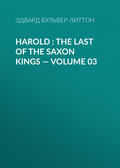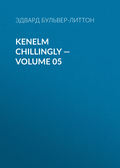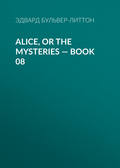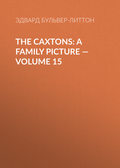
Эдвард Бульвер-Литтон
What Will He Do with It? — Volume 07
Darrell heard no more of Matilda, till, not long afterwards, her death was announced to him. She had died from exhaustion shortly after giving birth to a female child. The news came upon him at a moment; when, from other causes—(the explanation of which, forming no part of his confidence to Alban, it will be convenient to reserve)—his mind was in a state of great affliction and disorder—when he had already buried himself in the solitudes of Fawley—ambition resigned and the world renounced—and the intelligence saddened and shocked him more than it might have done some months before. If, at that moment of utter bereavement, Matilda's child had been brought to him—given up to him to rear—would he have rejected it? would he have forgotten that it was a felon's grandchild?
I dare not say. But his pride was not put to such a trial. One day he received a packet from Mr. Gotobed, enclosing the formal certificates of the infant's death, which had been presented to him by Jasper, who had arrived in London for that melancholy purpose, with which he combined a pecuniary proposition. By the death of Matilda and her only child, the sum of L10,000 absolutely reverted to Jasper in the event of Darrell's decease. As the interest meanwhile was continued to Jasper, that widowed mourner suggested "that it would be a great boon to himself and no disadvantage to Darrell if the principal were made over to him at once. He had been brought up originally to commerce. He had abjured all thoughts of resuming such vocation during his wife's lifetime, out of that consideration for her family and ancient birth which motives of delicacy imposed. Now that the connection with Mr. Darrell was dissolved, it might be rather a relief than otherwise to that gentleman to know that a son-in-law so displeasing to him was finally settled, not only in a foreign land, but in a social sphere in which his very existence would soon be ignored by all who could remind Mr. Darrell that his daughter had once a husband. An occasion that might never occur again now presented itself. A trading firm at Paris, opulent, but unostentatiously quiet in its mercantile transactions, would accept him as a partner could he bring to it the additional capital of L10,000." Not without dignity did Jasper add, "that since his connection had been so unhappily distasteful to Mr. Darrell, and since the very payment, each quarter, of the interest on the sum in question must in itself keep alive the unwelcome remembrance of that connection, he had the less scruple in making a proposition which would enable the eminent personage who so disdained his alliance to get rid of him altogether." Darrell closed at once with Jasper's proposal, pleased to cut off from his life each tie that could henceforth link it to Jasper's, nor displeased to relieve his hereditary acres from every shilling of the marriage portion which was imposed on it as a debt, and associated with memories of unmingled bitterness. Accordingly, Mr. Gotobed, taking care first to ascertain that the certificates as to the poor child's death were genuine, accepted Jasper's final release of all claim on Mr. Darrell's estate. There still, however, remained the L200 a year which Jasper had received during Matilda's life, on the tacit condition of remaining Mr. Hammond, and not personally addressing Mr. Darrell. Jasper inquired "if that annuity was to continue?" Mr. Gotobed referred the inquiry to Darrell, observing that the object for which this extra allowance had been made was rendered nugatory by the death of Mrs. Hammond and her child; since Jasper henceforth could have neither power nor pretext to molest Mr. Darrell, and that it could signify but little what name might in future be borne by one whose connection with the Darrell family was wholly dissolved. Darrell impatiently replied, "That nothing having been said as to the withdrawal of the said allowance in case Jasper became a widower, he remained equally entitled, in point of honour, to receive that allowance, or an adequate equivalent."
This answer being intimated to Jasper, that gentleman observed "that it was no more than he had expected from Mr. Darrell's sense of honour," and apparently quite satisfied, carried himself and his L10,000 back to Paris. Not long after, however, he wrote to Mr. Gotobed that "Mr. Darrell having alluded to an equivalent for the L200 a year allowed to him, evidently implying that it was as disagreeable to Mr. Darrell to see that sum entered quarterly in his banker's books, as it had been to see there the quarterly interest of the L10,000, so Jasper might be excused in owning that he should prefer an equivalent. The commercial firm to which he was about to attach himself required a somewhat larger capital on his part than he had anticipated, &c., &c. Without presuming to dictate any definite sum, he would observe that L1,500 or even L1000 would be of more avail to his views and objects in life than an annuity of L200 a year, which, being held only at will, was not susceptible of a temporary loan." Darrell, wrapped in thoughts wholly remote from recollections of Jasper, chafed at being thus recalled to the sense of that person's existence wrote back to the solicitor who transmitted to him this message, "that an annuity held on his word was not to be calculated by Mr. Hammond's notions of its value. That the L200 a year should therefore be placed on the same footing as the L500 a year that had been allowed on a capital of L10,000; that accordingly it might be held to represent a principal of L4,000, for which he enclosed a cheque, begging Mr. Gotobed not only to make Mr. Hammond fully understand that there ended all possible accounts or communication between them, but never again to trouble him with any matters whatsoever in reference to affairs that were thus finally concluded." Jasper, receiving the L4,000, left Darrell and Gotobed in peace till the following year. He then addressed to Gotobed an exceedingly plausible, business-like letter. "The firm he had entered, in the silk trade, was in the most flourishing state—an opportunity occurred to purchase a magnificent mulberry plantation in Provence, with all requisite magnanneries, &c., which would yield an immense increase of profit. That if, to insure him a share in this lucrative purchase, Mr. Darrell could accommodate him for a year with a loan of L2,000 or L3,000, he sanguinely calculated on attaining so high a position in the commercial world as, though it could not render the recollection of his alliance more obtrusive to Mr. Darrell, would render it less humiliating."
Mr. Gotobed, in obedience to the peremptory instructions he had received from his client, did not refer this letter to Darrell, but having occasion at that time to visit Paris on other business, he resolved (without calling on Mr. Hammond) to institute there some private inquiry- into that rising trader's prospects and status. He found, on arrival at Paris, these inquiries difficult. No one in either the /beau monde/ or in the /haut commerce/ seemed to know anything about this Mr. Jasper Hammond. A few fashionable English /roues/ remembered to have seen, once or twice during Matilda's life, and shortly after her decease, a very fine-looking man shooting meteoric across some equivocal /salons/, or lounging in the Champs Elysees, or dining at the Cafe de Paris; but of late that meteor had vanished. Mr. Gotobed, then anxiously employing a commissioner to gain some information of Mr. Hammond's firm at the private residence from which Jasper addressed his letter, ascertained that in that private residence Jasper did not reside. He paid the porter to receive occasional letters, for which he called or sent; and the porter, who was evidently a faithful and discreet functionary, declared his belief that Monsieur Hammond lodged in the house in which he transacted business, though where was the house or what was the business, the porter observed, with well-bred implied rebuke, "Monsieur Hammond was too reserved to communicate, he himself too incurious to inquire." At length, Mr. Gotobed's business, which was, in fact, a commission from a distressed father to extricate an imprudent son, a mere boy, from some unhappy associations, having brought him into the necessity of seeing persons who belonged neither to the /beau monde/ nor to the /haut commerce/, he gleaned from them the information he desired. Mr. Hammond lived in the very heart of a certain circle in Paris, which but few Englishmen ever penetrate. In that circle Mr. Hammond had, on receiving his late wife's dowry, become the partner in a private gambling hell; in that hell had been engulfed all the monies he had received—a hell that ought to have prospered with him, if he could have economised his villanous gains. His senior partner in that firm retired into the country with a fine fortune—no doubt the very owner of those mulberry plantations which were now on sale! But Jasper scattered napoleons faster than any croupier could rake them away. And Jasper's natural talent for converting solid gold into thin air had been assisted by a lady who, in the course of her amiable life, had assisted many richer men than Jasper to lodgings in /St. Pelagie/, or cells in the /Maison des Fous/. With that lady he had become acquainted during the lifetime of his wife, and it was supposed that Matilda's discovery of this liaison had contributed perhaps to the illness which closed in her decease; the name of that lady was Gabrielle Desinarets. She might still be seen daily at the Bois de Boulogne, nightly at opera-house or theatre; she had apartments in the Chaussee d'Antin far from inaccessible to Mr. Gotobed, if he coveted the honour of her acquaintance. But Jasper was less before an admiring world. He was supposed now to be connected with another gambling-house of lower grade than the last, in which he had contrived to break his own bank and plunder his own till. It was supposed also that he remained good friends with Mademoiselle Desmarets; but if he visited her at her house, he was never to be seen there. In fact, his temper was so uncertain, his courage so dauntless, his strength so prodigious, that gentlemen who did not wish to be thrown out of the window, or hurled down a staircase, shunned any salon or boudoir in which they had a chance to encounter him. Mademoiselle Desmarets had thus been condemned to the painful choice between his society and that of nobody else, or that of anybody else with the rigid privation of his. Not being a turtle-dove, she had chosen the latter alternative. It was believed, nevertheless, that if Gabrielle Desmarets had known the weakness of a kind sentiment, it was for this turbulent lady-killer; and that, with a liberality she had never exhibited in any other instance, when she could no longer help him to squander, she would still, at a pinch, help him to live; though, of course, in such a reverse of the normal laws of her being, Mademoiselle Desmarets set those bounds on her own generosity which she would not have imposed upon his, and had said with a sigh: "I could forgive him if he beat me and beggared my friends! but to beat my friends and to beggar me,—that is not the kind of love which makes the world go round!"
Scandalised to the last nerve of his respectable system by the information thus gleaned, Mr. Gotobed returned to London. More letters from Jasper—becoming urgent, and at last even insolent—Mr. Gotobed worried into a reply, wrote back shortly "that he could not even communicate such applications to Mr. Darrell, and that he must peremptorily decline all further intercourse, epistolary or personal, with Mr. Hammond."
Darrell, on returning from one of the occasional rambles on the Continent, "remote, unfriended, melancholy," by which he broke the monotony of his Fawley life, found a letter from Jasper, not fawning, but abrupt, addressed to himself, complaining of Mr. Gotobed's improper tone, requesting pecuniary assistance, and intimating that he could in return communicate to Mr. Darrell an intelligence that would give him more joy than all his wealth could purchase. Darrell enclosed that note to Mr. Gotobed; Mr. Gotobed came down to Fawley to make those revelations of Jasper's mode of life which were too delicate—or too much the reverse of delicate—to commit to paper. Great as Darrell's disgust at the memory of Jasper had hitherto been, it may well be 'conceived how much more bitter became that memory now. No answer was, of course, vouchsafed to Jasper, who, after another extremely forcible appeal for money, and equally enigmatical boast of the pleasurable information it was in his power to bestow, relapsed into sullen silence.
One day, somewhat more than five years after Matilda's death, Darrell, coming in from his musing walks, found a stranger waiting for him. This stranger was William Losely, returned from penal exile; and while Darrell, on hearing this announcement, stood mute with haughty wonder that such a visitor could cross the threshold of his father's house, the convict began what seemed to Darrell a story equally audacious and incomprehensible—the infant Matilda had borne to Jasper, and the certificates of whose death had been so ceremoniously produced and so prudently attested, lived still! Sent out to nurse as soon as born, the nurse had in her charge another babe, and this last was the child who had died and been buried as Matilda Hammond's. The elder Losely went on to stammer out a hope that his son was not at the time aware of the fraudulent exchange, but had been deceived by the nurse—that it had not been a premeditated imposture of his own to obtain his wife's fortune.
When Darrell came to this part of his story, Alban Morley's face grew more seriously interested. "Stop!" he said; "William Losely assured you of his own conviction that this strange tale was true. What proofs did he volunteer?"
"Proofs! Death, man, do you think that at such moments I was but a bloodless lawyer, to question and cross examine? I could but bid the impostor leave the house which his feet polluted."
Alban heaved a sigh, and murmured, too low for Darrell to overhear, "Poor Willy!" then aloud: "But, my dear friend, bear with me one moment. Suppose that, by the arts of this diabolical Jasper, the exchange really had been effected, and a child to your ancient line lived still, would it not be a solace, a comfort—"
"Comfort!" cried Darrell, "comfort in the perpetuation of infamy! The line I promised my father to restore to its rank in the land, to be renewed in the grandchild of a felon!—in the child of the yet viler sharper of a hell! You, gentleman and soldier, call that thought— 'comfort!' O Alban!—out on you! Fie! fie! No!—leave such a thought to the lips of a William Losely! He indeed, clasping his hands, faltered forth some such word; he seemed to count on my forlorn privation of kith and kindred—no heir to my wealth—no representative of my race—would I deprive myself of—ay—your very words—of a solace—a comfort! He asked me, at least, to inquire."
"And you answered?"
"Answered so as to quell and crush in the bud all hopes in the success of so flagrant a falsehold—answered: 'Why inquire? Know that, even if your tale were true, I have no heir, no representative, no descendant in the child of Jasper—the grandchild of William-Losely. I can at least leave my wealth to the son of Charles Haughton. True, Charles Haughton was a spendthrift, a gamester; but he was neither a professional cheat nor a convicted felon.'"
"You said that—Oh, Darrell!"
The Colonel checked himself. But for Charles Haughton, the spendthrift and gamester, would William Losely have been the convicted felon? He checked that thought, and hurried on: "And how did William Losely reply?"
"He made no reply—he skulked away without a word." Darrell then proceeded to relate the interview which Jasper had forced on him at Fawley during Lionel's visit there—on Jasper's part an attempt to tell the same tale as William had told—on Darrell's part, the same scornful refusal to hear it out. "And," added Darrell, "the man, finding it thus impossible to dupe my reason, had the inconceivable meanness to apply to me for alms. I could not better show the disdain in which I held himself and his story than in recognising his plea as a mendicant. I threw my purse at his feet, and so left him.
"But," continued Darrell, his brow growing darker and darker—" but wild and monstrous as the story was, still the idea that it MIGHT be true—a supposition which derived its sole strength from the character of Jasper Losely—from the interest he had in the supposed death of a child that alone stood between himself and the money he longed to grasp—an interest which ceased when the money itself was gone, or rather changed into the counter-interest of proving a life that, he thought, would re-establish a hold on me—still, I say, an idea that the story might be true would force itself on my fears, and if so, though my resolution never to acknowledge the child of Jasper Losely as a representative, or even as a daughter, of my house, would of course be immovable—yet it would become my duty to see that her infancy was sheltered, her childhood reared, her youth guarded, her existence amply provided for."
"Right—your plain duty," said Alban bluntly. "Intricate sometimes are the obligations imposed on us as gentlemen; 'noblesse oblige' is a motto which involves puzzles for a casuist; but our duties as men are plain— the idea very properly haunted you—and—"
"And I hastened to exorcise the spectre. I left England—I went to the French town in which poor Matilda died—I could not, of course, make formal or avowed inquiries of a nature to raise into importance the very conspiracy (if conspiracy there were) which threatened me. But I saw the physician who had attended both my daughter and her child—I sought those who had seen them both when living—seen them both when dead. The doubt on my mind was dispelled—not a pretext left for my own self-torment. The only person needful in evidence whom I failed to see was the nurse to whom the infant had been sent. She lived in a village some miles from the town—I called at her house—she was out. I left word I should call the next day—I did so—she had absconded. I might, doubtless, have traced her, but to what end if she were merely Jasper's minion and tool? Did not her very flight prove her guilt and her terror? Indirectly I inquired into her antecedents and character. The inquiry opened a field of conjecture, from which I hastened to turn my eyes. This woman had a sister who had been in the service of Gabrielle Desmarets, and Gabrielle Desmarets had been in the neighbourhood during my poor daughter's life- time, and just after my daughter's death. And the nurse had had two infants under her charge; the nurse had removed with one of them to Paris—and Gabrielle Desmarets lived in Paris—and, O Alban, if there be really in flesh and life a child by Jasper Losely, to be forced upon my purse or my pity—is it his child, not by the ill-fated Matilda, but by the vile woman for whom Matilda, even in the first year of wedlock, was deserted? Conceive how credulity itself would shrink appalled from the horrible snare!—I to acknowledge, adopt, proclaim as the last of the Darrells, the adulterous offspring of a Jasper Losely and a Gabrielle Desmarets!—or, when I am in my grave, some claim advanced upon the sum settled by my marriage articles on Matilda's issue, and which, if a child survived, could not have been legally transferred to its father—a claim with witnesses suborned—a claim that might be fraudulently established —a claim that would leave the representative—not indeed of my lands and wealth, but, more precious far, of my lineage and blood—in—in the person of—of—"
Darrell paused, almost stifling, and became so pale that Alban started from his seat in alarm.
"It is nothing," resumed Darrell, faintly, "and, ill or well, I must finish this subject now, so that we need not reopen it."
"I remained abroad, as you know, for some years. During that time two or three letters from Jasper Losely were forwarded to me; the latest in date more insolent than all preceding ones. It contained demands as if they were rights, and insinuated threats of public exposure, reflecting on myself and my pride: 'He was my son-in-law after all, and if he came to disgrace, the world should know the tie.' Enough. This is all I knew until the man who now, it seems, thrusts himself forward as Jasper Losely's friend or agent, spoke to me the other night at Mrs. Haughton's. That man you have seen, and you say that he—"
"Represents Jasper's poverty as extreme; his temper unscrupulous and desperate; that he is capable of any amount of scandal or violence. It seems that though at Paris he has (Poole believes) still preserved the name of Hammond, yet that in England he has resumed that of Losely; and seems by Poole's date of the time at which he, Poole, made Jasper's acquaintance, to have done so after his baffled attempt on you at Fawley- whether in so doing he intimated the commencement of hostilities, or whether, as is more likely, the sharper finds it convenient to have one name in one country, and one in another, 'tis useless to inquire; enough that the identity between the Hammond who married poor Matilda, and the Jasper Losely whose father was transported, that unscrupulous rogue has no longer any care to conceal. It is true that the revelation of this identity would now be of slight moment to a man of the world-as thick- skinned as myself, for instance; but to you it would be disagreeable- there is no denying that—and therefore, in short, when Mr. Poole advises a compromise, by which Jasper could be secured from want and yourself from annoyance, I am of the same opinion as Mr. Poole is."
"You are?"
"Certainly. My dear Darrell, if in your secret heart there was something so galling in the thought that the man who had married your daughter, though without your consent, was not merely the commonplace adventurer whom the world supposed, but the son of that poor dear—I mean that rascal who was transported, Jasper, too, himself a cheat and a sharper-if this galled you so, that you have concealed the true facts from myself, your oldest friend, till this day—if it has cost you even now so sharp a pang to divulge the true name of that Mr. Hammond, whom our society never saw, whom even gossip has forgotten in connection with yourself—how intolerable would be your suffering to have this man watching for you in the streets, some wretched girl in his hand, and crying out, 'A penny for your son-in-law and your grandchild!' Pardon me—I must be blunt. You can give him to the police—send him to the treadmill. Does that mend the matter? Or, worse still, suppose the man commits some crime that fills all the newspapers with his life and adventures, including of course his runaway marriage with the famous Guy Darrell's heiress—no one would blame you, no one respect you less; but do not tell me that you would not be glad to save your daughter's name from being coupled with such a miscreant's at the price of half your fortune."
"Alban'" said Darrell, gloomily, "you can say nothing on this score that has not been considered by myself. But the man has so placed the matter, that honour itself forbids me to bargain with him for the price of my name. So long as he threatens, I cannot buy off a threat; so long as he persists in a story by which he would establish a claim on me on behalf of a child whom I have every motive as well as every reason to disown as inheriting my blood—whatever I bestowed on himself would seem like hush- money to suppress that claim."
"Of course—I understand, and entirely agree with you. But if the man retract all threats, confess his imposture in respect to this pretended offspring, and consent to retire for life to a distant colony, upon an annuity that may suffice for his wants, but leave no surplus beyond, to render more glaring his vices, or more effective his powers of evil; if this could be arranged between Mr. Poole and myself, I think that your peace might be permanently secured without the slightest sacrifice of honour. Will you leave the matter in my hands on this assurance—that I will not give this person a farthing except on the conditions I have premised?"
"On these conditions, yes, and most gratefully," said Darrell. "Do what you will; but one favour more: never again speak to me (unless absolutely compelled) in reference to this dark portion of my inner life."
Alban pressed his friend's hand, and both were silent for some moments. Then said the Colonel, with an attempt at cheerfulness: "Darrell, more than ever now do I see that the new house at Fawley, so long suspended, must be finished. Marry again you must!—you can never banish old remembrances unless you can supplant them by fresh hopes."
"I feel it—I know it," cried Darrell, passionately. And oh! if one remembrance could be wrenched away! But it shall—it shall!"
"Ah!" thought Alban—" the remembrance of his former conjugal life!—a remembrance which might well make the youngest and the boldest Benedict shrink from the hazard of a similar experiment."
In proportion to the delicacy, the earnestness, the depth of a man's nature, will there be a something in his character which no male friend can conceive, and a something in the secrets of his life which no male friend can ever conjecture.







